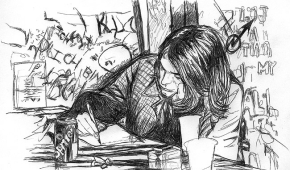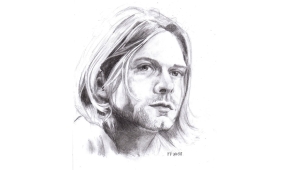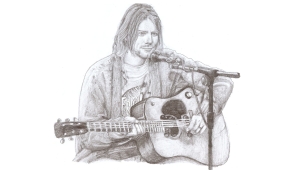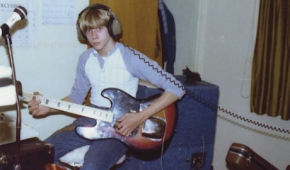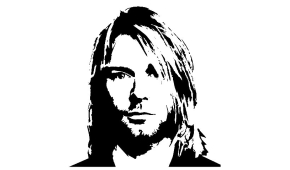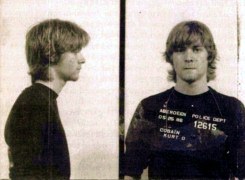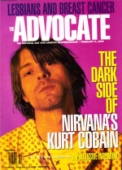The Dark Side of Kurt Cobain
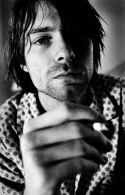 by
Kevin Allman (from The Advocate 2/93)
by
Kevin Allman (from The Advocate 2/93)
It's 4 o'clock on a cold Seattle afternoon, and Kurt Cobain, the
lyricist-guitarist-lead singer of Nirvana, is sitting in a downtown hotel
room, playing with his 5-month-old daughter, Frances, while his wife,
Courtney Love-lead singer of her own band, Hole-applies her makeup. At the
moment, the Cobains (including the baby) are on the cover of Spin
magazine-which has named Nirvana as Artist of the Year-and the band's new
album, Insecticide, is due out within the week. The Nirvana media machine
should be in high gear.
But, no.
What's surprising is what's not in the Cobains' room: no entourage, no
groupies, no publicists, and no signs of the high life-in any sense of the
term. Cobain, in fact, is wearing a pair of fuzzy green pajamas. And he and
Love are in Seattle for the sole reason of trying to speed the deal on a
modest house they've been trying to buy. The only concession to Cobain's
being what he mockingly calls "a rock icon" is the pseudonym under which he
has registered, Simon Ritchie.
It's a joke-Ritchie was the real name of Sid Vicious, the Sex Pistol who
died from a heroin overdose-and it shows that the Cobains have a sense of
humor about being tagged by the press as a modern-day Sid and Nancy. If the
Cobains are being reclusive these days, they explain, it's not because they
feel they've been strung up-by the media, which they feel have painted them
as a pair of junkies without a cause. "Everyone thinks we're on drugs again,
even people we work with," says Cobain resignedly as Love paints on a
perfect baby-doll mouth. "I guess I'll have to get used to that for the rest
of my life."
While Cobain, 24, is quiet and thoughtful, Love is tailor-made for the media
attention, blessed and cursed with what seems as an almost genetic inability
to censor herself. Within the first five minutes of The ADVOCATE's arrival,
she is spinning a story about an ex-flame and his lingerie fetish: "He had
to wear nylons to have sex-not just any nylons but flesh-colored nylons. And
he couldn't buy them, he had to find them." Listening, cobain smiles,
holding Frances by her arms, walking her across his lap. He is-at least for
the moment-not feeling beat up.
Getting beaten up, though, is a recurring theme in Cobain's life. In his
hometown of Aberdeen in rural Washington, he was branded a "faggot" from an
early age. It was a title he eventually embraced and threw back in his
tormentors' faces-just for the hell of it. In 1985 he was even arrested when
he and friend Chris Novoselic spray painted HOMO SEX RULES on the side of a
bank.
Four years later, Cobain, Novoselic, and drummer Dave Grohl released the
first Nirvana album, Bleach, on a small Seattle label Sub Pop Records.
Recorded for $606.15, it was a blast of pure punk rock that earned them a
reputation in Seattle and drew the interest of several major labels. Their
major-label debut, Nevermind, was released by DGC in September 1991-and by
the end of the year, Nevermind (fueled by the inescapably catchy "Smells
Like Teen Spirit") had come from far left field to sell 3 million copies and
top critics' best-of-the-year lists. Last January cellular phones all over
the record industry were crackling when Nirvana hit number one-toppling U2,
Metallica, and Michael Jackson from the top of the chart. Punk rock was
suddenly a commodity, and the term grunge, denoting flannel shirts, ripped
jeans, dirty hair, and especially anything Seattle-based, entered the
lexicon. Soon record executives were spending weekends in Seattle, trying to
find the "next Nirvana," and models cropped up on Paris runways sporting
haute grungewear.
But even as Nirvana went from playing club dates to selling out 40,000-seat
arenas, the band still didn't play by the rules. They spurned an offer to
tour with Guns N' Roses, further fueling already rampant industry rumors
that Cobain and his then pregnant wife had a big problem with heroin. Last
April, when Rolling Stone put the band on its cover, Cobain showed up for
the photo session in a T-shirt that read CORPORATE MAGAZINES STILL SUCK. And
an unflattering profile of the Cobains in September's Vanity Fair dropped
the two into the world of glossy journalism with a jolt when Love confirmed
to writer Lynn Hirschberg that she and Cobain were indeed using heroin in
the early stages on her pregnancy.
While not denying the heroin use, both Cobain and Love insist that they have
been misquoted and misunderstood. They maintain that the interview was given
early in the year, and at the time the article appeared (the same month Love
gave birth to Frances), both had been clean for several months. "When I
first talked to her [Hirschberg], I had just found out that I was pregnant,
and I had done some drugs in the beginning of my pregnancy, and that's what
I told her," says Love.
Equally misunderstood, to Cobain, is Nirvana itself-particularly the fact
that the band appeals to many of the same hard rock fans who pack Guns N'
Roses concerts. But while Axl Rose san derisively of "immigrants and
faggots" in his song "One in a Million," Cobain closed his song "Stay Away"
by howling "God is gay!" and Nirvana defiantly cavorted in dresses in the
video of their hit single "In Bloom." Last year Nirvana traveled to Oregon
to perform at a benefit opposing Measure 9, a statewide ordinance that would
have amended the state constitution to prohibit protections for gays and
lesbians. And when they appeared on Saturday Night Live, Cobain and
Novoselic made a point of kissing on-camera.
In person, Cobain is the antithesis of a preening guitar cocksman: He's
small, pale, soft-spoken, and articulate. Prejudice infuriates him: he spits
out the words "homophobe" and "sexist" with the same venom he reserves for
the word "spandex." Particularly upsetting to him was an incident last year
in Reno, when two men raped a woman while chanting a Nirvana song. On the
liner notes for Insecticide, he vented his frustration in a blunt statement
to Nirvana fans: "If any of you in any way hate homosexuals, people of
different color, or women, please do this one favor for us-leave us the fuck
alone! Don't come to our shows and don't buy our records."
Despite Cobain's wish that people "leave us the fuck alone," both he and
Love seem determined not to surround themselves with a glass bubble of
security precautions and stereotypical rock-star trappings. Before this
interview-the only one the band's lead singer says he plans to do for
Insecticide-Cobain set down no conditions regarding the questions that could
be asked, nor did he bother to notify his record company that the interview
would be taking place. (Love, in fact, insisted that the mutual friend
who arranged the meeting put The ADVOCATE in direct contact with the couple:
"Gay people can have our phone number")
Back in the hotel room, Love goes out and leaves Cobain to his interview,
but she's wary enough to come back twice: "I'm worried about what they're
going to write," she finally blurts. Still, her need to trust overwhelms her
protectiveness. While she leaves for the third time, she says, "it's a gay
publication, Kurt, so don't forget to tell them about the time you stole
your tights out of your mother's drawer." Cobain smiles; she laughs and
sighs, "I guess I have that effect on men. Bye." And then she's gone for
good, pushing Frances's stroller out the door.
You two don't seem like Sid and Nancy.
It's just amazing that at this point in rock-and-roll history, people are
still expecting their rock icons to live out these classic rock archetypes,
like Sid and Nancy. To assume that we're just the same because we did heroin
for a while-it's pretty offensive to be expected to be like that.
Does it hurt worse when they say bad things about Courtney?
Oh, absolutely. What they said about me is not half as strange as what
they've said about her. She doesn't deserve that. She sold 60,000 records,
and all of a sudden she's found herself as commercially popular as me, and
she's just in a punk rock band. Just because she married me, she's subjected
to being as popular as an actress or something.
Who do you trust now?
Uh-no one? [Laughs] I've always kind of kept myself purposely naive and
optimistic, and now I've been forced to be really paranoid. Judgmental.
Really defensive all the time. It's been hard for me to change my attitude.
You're here in this hotel room. Can you go out?
Yeah. The other night we went shopping at a second-hand store and bought
some fuzzy sweaters and some grungewear.
Real grungewear, not the designer kind?
Not Perry Ellis. [Laughs] We were driving around in our Volvo, after buying
some grungewear and we realized that we're not necessarily as big as Guns N'
Roses, but we're as popular as them, and we still don't have bodyguards. We
still go shopping, we still go to movies and carry on with our lives.
I've always been a paranoid person by nature anyhow, and now I have all
these people so concerned with what I say and what I do at all times that
it's really hard for me to deal with that. I'm dealing with it a lot better
than I would have expected. If I could have predicted what was going to
happen to me a few years ago, I definitely wouldn't have opted for this kind
of a life-style.
Would it be cooler to have stayed in Seattle and not been on the
cover of Rolling Stone?
Yeah. Well, I chose to do that-although it was a hell of a fight. We were on
tour in Australia, and I had completely forgotten that I had promised to do
the Rolling Stone piece. And that day, they called and said "Are you ready
to do the photo shoot?" And it was like, "No, I really don't want to do
this." I had so much pressure from my management and the band members-they
wanted to do it, and I just agreed. On my way there I just decided, "I'm
going to write something on my shirt that's offensive enough to stop getting
our picture on the cover." This way I could say that I actually played along
with it and still didn't get picked to be on the cover. I wasn't necessarily
challenging Rolling Stone, saying, "You suck" and "We don't want to have
anything to do with you, but we'll still use you for our exposure."
Rolling Stone sucks, has always sucked, and still sucks just because they
have a hip band on their cover. We're not as cool and hip as everyone
thinks. Having us on the cover isn't going to make Rolling Stone any cooler.
Ever since this band has been popular, I've always thought of us as just a
'90s version on Cheap Trick or the Knack. They had two sides of appeal that
made them kind of a cool band-a commercial side and kind of a new-wave side.
We have that.
Everything you do seems to get analyzed. You can't even say or do
anything off-the-cuff.
Yeah, I still have the same views I've always had. When I used to say things
to my friends, I didn't expect to be taken so seriously. Now I have to learn
to detour my thoughts and what I say in order to stop someone from saying
I'm a hypocrite. That was the Rolling Stone debate: "Corporate magazines
suck, but you're still on the cover." Well, of course! It's a joke. Get over
it.
People should take things rock stars say with a grain of salt because
there's no one in rock and roll right now who's a relevant example of a
spokesperson for anything. They do have an influence on people, and I think
there's a new consciousness that's really positive among rock stars, like
Rock the Vote. They're trying to make people aware, but I really can't think
of anyone who's really schooled enough to be political to the point that
would be required for a rock star. If Jello Biafra [former lead singer of
the Dead Kennedys] was a big international star, it would be really cool.
But he's not on a major label, and he doesn't write commercial enough music
to use that as a tool.
Does it make you laugh when people take apart all your songs, and
try to figure out what you're saying?
Oh, yeah. At the time I was writing those songs, I really didn't know what I
was trying to say. There's no point in my even trying to analyze or explain
it. That used to be the biggest subject in an interview: "What are your
lyrics about?" [Laughs] I haven't written any new lyrics, that's for sure.
We have about 12 songs for our new album we're scheduled to record in
February, and I don't have any lyrics at all. Within the past year,
notebooks and poetry books I've had lying around have either been destroyed
or stolen. So I don't have anything to go back on at all. It sucks.
The past year I haven't been very prolific at all. A few months ago we went
on tour to Europe, and before we went I took two of my favorite guitars and
all my poetry books and writings and two tapes that had guitar parts I was
going to use for the next record, and I put all this really important stuff
in our shower, because we've never really used our shower before. And the
roommates upstairs had a plumbing problem, so when we came back, everything
was destroyed, I don't have anything to go back on at all. It's pretty
scary.
I read the liner notes you wrote on Insecticide. I've never seen
somebody on a major label say, "If you're a racist, a sexist, a homophobe,
we don't want you to buy our records."
That's been the biggest problem that I've had being in this band. I know
there are those people out in the audience, and there's not much I can do
about it. I can talk about those issues in interviews-I think it's pretty
obvious that we're against the homophobes and the sexists and the racists,
but when "Teen Spirit" first came out, mainstream audiences were under the
assumption that we were just like Guns N' Roses.
Then our opinions started showing up in interviews. And then things like
Chris and I kissing on Saturday Night Live. We weren't trying to be
subversive or punk rock; we were just doing something insane and stupid at
the last minute. I think now that our opinions our out in the open, a lot of
kids who bought our record regret knowing anything about us. [Laughs]
There is a war going on in the high schools now between Nirvana kids and
Guns N' Roses kids. It's really cool. I'm really proud to be a part of that,
because when I was in high school, I dressed like a punk rocker and people
would scream "Devo!" at me-because Devo infiltrated the mainstream. Out of
all the bands who came from the underground and actually made it in the
mainstream, Devo is the most subversive and challenging of all. They're just
awesome. I love them.
Maybe there'll be a Devo revival soon, like the Village People
revival.
I saw the Village People two years ago in Seattle! They were so cool. They
still had the same costumes.
Page 1 | Page 2
